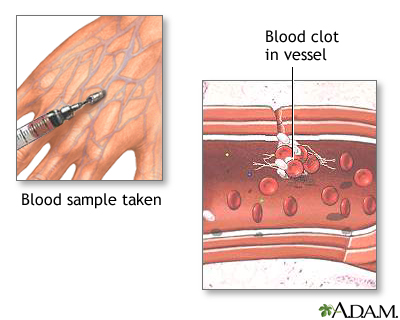Health Library
Factor XII (Hageman factor) deficiency
F12 deficiency; Hageman factor deficiency; Hageman trait; HAF deficiency
Factor XII deficiency is an inherited disorder that affects a protein (factor XII) involved in blood clotting.
Images

I Would Like to Learn About:
Causes
When you bleed, a series of reactions take place in the body that helps blood clots form. This process is called the coagulation cascade. It involves special proteins called coagulation or clotting factors. You may have a higher chance of excess bleeding if one or more of these factors are missing or are not functioning as they should.
Factor XII is one such factor. A lack of this factor does not cause you to bleed abnormally. But, the blood takes longer than normal to clot in a test tube.
Factor XII deficiency is a rare inherited disorder.
Symptoms
There are usually no symptoms.
Exams and Tests
Factor XII deficiency is most often found when clotting tests are done for routine screening.
Tests may include:
- Factor XII assay to measure the activity of factor XII
- Partial thromboplastin time (PTT) to check how long it takes for blood to clot
- Mixing study, a special PTT test to confirm factor XII deficiency
Treatment
Treatment is usually not needed.
Support Groups
More information and support for people with factor XII deficiency and their families can be found at:
- National Hemophilia Foundation -- www.hemophilia.org/bleeding-disorders-a-z/types/other-factor-deficiencies/factor-xii
- National Organization for Rare Disorders -- rarediseases.org/rare-diseases/factor-xii-deficiency/
- NIH Genetic and Rare Diseases Information Center -- rarediseases.info.nih.gov/diseases/6558/factor-xii-deficiency
Outlook (Prognosis)
The outcome is expected to be good without treatment.
Possible Complications
There are usually no complications.
When to Contact a Medical Professional
The health care provider usually discovers this condition when running other lab tests.
Prevention
This is an inherited disorder. There is no known way to prevent it.
References
Gailani D, Wheeler AP, Neff AT. Rare coagulation factor deficiencies. In: Hoffman R, Benz EJ, Silberstein LE, et al, eds. Hematology: Basic Principles and Practice. 7th ed. Philadelphia, PA: Elsevier; 2018:chap 137.
Hall JE, Hall ME. Hemostasis and blood coagulation. In: Hall JE, Hall ME, eds. Guyton and Hall Textbook of Medical Physiology. 14th ed. Philadelphia, PA: Elsevier; 2021:chap 37.
Ragni MV. Hemorrhagic disorders: coagulation factor deficiencies. In: Goldman L, Schafer AI, eds. Goldman-Cecil Medicine. 26th ed. Philadelphia, PA: Elsevier; 2020:chap 165.
BACK TO TOPReview Date: 1/19/2021
Reviewed By: Todd Gersten, MD, Hematology/Oncology, Florida Cancer Specialists & Research Institute, Wellington, FL. Review provided by VeriMed Healthcare Network. Also reviewed by David Zieve, MD, MHA, Medical Director, Brenda Conaway, Editorial Director, and the A.D.A.M. Editorial team.
 | A.D.A.M., Inc. is accredited by URAC, for Health Content Provider (www.urac.org). URAC's accreditation program is an independent audit to verify that A.D.A.M. follows rigorous standards of quality and accountability. A.D.A.M. is among the first to achieve this important distinction for online health information and services. Learn more about A.D.A.M.'s editorial policy, editorial process and privacy policy. A.D.A.M. is also a founding member of Hi-Ethics. This site complies with the HONcode standard for trustworthy health information: verify here. |
The information provided herein should not be used during any medical emergency or for the diagnosis or treatment of any medical condition. A licensed medical professional should be consulted for diagnosis and treatment of any and all medical conditions. Links to other sites are provided for information only -- they do not constitute endorsements of those other sites. © 1997- 2021 A.D.A.M., a business unit of Ebix, Inc. Any duplication or distribution of the information contained herein is strictly prohibited.
